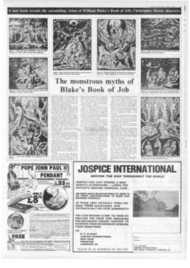Page 3, 19th March 1982
Page 3

Report an error
Noticed an error on this page?If you've noticed an error in this article please click here to report it.
Tags
Share
Related articles
Churches Unite On Moral Values
Us Bishops Praise Arcic
Bishop Murphy-o'connor Co-chairs Arcic Ii
Burying The Hatchet In The Arcic Final Report
Archbishop Of Birmingham To Chair Next Arcic Session
How Arcic sees the place of the Pope
THE FINAL Report of the Anglican/Roman Catholic International Commission (Arcic) — the product of 12 years' work by an international team of scholars appointed by the Archbishop of Canterbury and the Vatican's Secretariat for Christian Unity — includes several individual reports that Arcic had previously published, plus two major new documents.
The earlier documents were statements of agreement on the Eucharist (1971), Ministry and Ordination (1973), Authority in the Church I (1976), and elucidations on the first two of those documents (1979). The new texts in the Final Report, besides a preface, introduction and conclusion to the whole report, are Authority in the Church II and an elucidation on the earlier authority report.
It is on Authority in the Church II that most attention will be focused as the report becomes public and is read by members of both churches.
It addresses four key issues that were left unresolved by the previous authority report. These are: — The interpretation of the "Petrine texts" or scriptural passages about St Peter's particular role in the church; — The meaning of the "divine right" ascribed by Catholics to the primacy of the bishop of Rome in the universal church: — The Catholic affirmation of papal infallibility; and — The nature of the jurisdiction, or legal authority, ascribed to the bishop of Rome as universal primate.
In each of the four areas, the Arcic calls on the world's more than 700 million Catholics and 63 million Anglicans to overcome polemical language of the past and see if they can agree on language which adequately expresses the faith of both, without requiring either Catholics or Anglicans to compromise on what they consider essential.
"Fundamental to all our statements is the concept of 'koinonia'.... Although `koirionia' is never equated with 'church' in the New Testament, it is the term that most aptly expresses the mystery underlying the various New Testament images of the church," says the introduction to the Final Report.
Looking at the scriptural basis of papal primacy, the report notes that the New Testament "contains no explicit record of a transmission of Peter's leadership" and that the Petrine texts were given different interpretations even in the early church.
"Yet the church at Rome, the city in which Peter and Paul taught and were martyred, came to be recognised as possessing a unique responsibility among the churches: its bishop was seen to perform a special service in relation to the unity of the churches, and in relation to fidelity to the apostolic inheritance," the report says.
"If the leadership of the bishop of Rome has been rejected by those who thought it was not faithful to the truth of the Gospel and hence not a true focus of unity, we nevertheless agree that a universal primacy will be needed in a reunited church and should appropriately be the primacy of the bishop of Rome ... In a reunited church a ministry modelled on the role of Peter will be a sign and safeguard of such unity."
In discussing whether the universal primacy of the Pope is a matter of "ius divinum" — divine law or divine right — as held by Roman Catholics, the report notes that this phrase is subject to different interpretations among Catholics. It also notes that Anglican tradition refers to the emergence of a primacy by "divine providence".
Citing recent developments in Catholic teaching, the report rejects the common view of many Anglicans "that the claim to divine right for the Roman primacy implied a denial that the churches of the Anglican Communion are churches."
"The doctrine that a universal primacy expresses the will of God does not entail the consequence that a Christian community out of communion with the See of Rome does not belong to the Church of God," the report says.
"In the past," it says, "Roman Catholic teaching that the bishop of Rome is universal primate by divine right or law has been regarded by Anglicans as unacceptable. However, we believe that the primacy of the bishop of Rome can be affirmed as part of God's design for the universal 'koinonia' in terms which are compatible with both our traditions."
Concerning the declaration by the 19th-century First Vatican Council that the Pope has universal, ordinary and immediate jurisdiction over the whole church and in all its parts, the report said that this is "a source of anxiety to Anglicans".
It said, however, that such jurisdiction should be exercised "not in isolation but in collegial association with his brother bishops".
"Primacy is not an autocratic power over the church but a service in and to the church... The purpose of the universal primate's jurisdiction is to enable him to further catholicity as weft as unity and to foster and draw together the riches of the diverse traditions of the churches," the document said.
Through both councils and a universal primate, they said, "the church can make a decisive judgment in matters of faith, and so exclude error".
Regarding the possibility of Anglican acceptance of a universal primate's binding statement of faith or morals, the report commented, "If the definition proposed for assent were not manifestly a legitimate interpretation of biblical faith and in line with orthodox tradition, Anglicans would think it a duty to reserve the reception of the definition for study and discussion."
"Although it is not through reception by the people of God that a definition first acquired authority, the assent of the faithful is the ultimate indication that the church's authoritative decision in a matter of faith has been truly preserved from error by the Holy Spirit," the report said.
In attempting to describe how the church is preserved from error, the ARCIC theologians said they avoided the use of the term "infallibility" because of dangers of misunderstandings. "We also recognise," they added, "that the ascription to the bishop of Rome of infallibility under certain conditions has tended to lend exaggerated importance to all his statements."
The report also raised specific questions about the dogmas of the Immaculate Conception of Mary and her Assumption "the only examples of such dogmas promulgated by the bishop of Rome apart from a synod since the separation of our two communions".
Anglicans and Catholics "can agree in much of the truth" that the two Marian dogmas are designed to affirm, the report said, but they create "a special problem for those Anglicans who do not consider that the precise definitions given by these dogmas are sufficiently supported by Scripture".
"We suggest that some difficulties will not be wholly resolved until a practical initiative has been taken and our two churches have lived together more visibly in the one 'koinonia'," they concluded.
blog comments powered by Disqus













